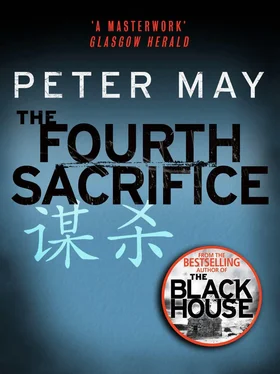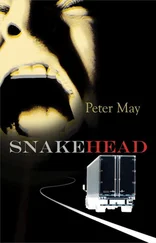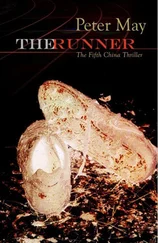Peter May - The Fourth Sacrifice
Здесь есть возможность читать онлайн «Peter May - The Fourth Sacrifice» весь текст электронной книги совершенно бесплатно (целиком полную версию без сокращений). В некоторых случаях можно слушать аудио, скачать через торрент в формате fb2 и присутствует краткое содержание. Год выпуска: 2012, Издательство: Quercus, Жанр: Триллер, на английском языке. Описание произведения, (предисловие) а так же отзывы посетителей доступны на портале библиотеки ЛибКат.
- Название:The Fourth Sacrifice
- Автор:
- Издательство:Quercus
- Жанр:
- Год:2012
- ISBN:нет данных
- Рейтинг книги:4 / 5. Голосов: 1
-
Избранное:Добавить в избранное
- Отзывы:
-
Ваша оценка:
- 80
- 1
- 2
- 3
- 4
- 5
The Fourth Sacrifice: краткое содержание, описание и аннотация
Предлагаем к чтению аннотацию, описание, краткое содержание или предисловие (зависит от того, что написал сам автор книги «The Fourth Sacrifice»). Если вы не нашли необходимую информацию о книге — напишите в комментариях, мы постараемся отыскать её.
The Fourth Sacrifice — читать онлайн бесплатно полную книгу (весь текст) целиком
Ниже представлен текст книги, разбитый по страницам. Система сохранения места последней прочитанной страницы, позволяет с удобством читать онлайн бесплатно книгу «The Fourth Sacrifice», без необходимости каждый раз заново искать на чём Вы остановились. Поставьте закладку, и сможете в любой момент перейти на страницу, на которой закончили чтение.
Интервал:
Закладка:
There were two officers there from the forensics department at Pao Jü Hutong. They were dusting for prints. The senior officer, a small, wizened man called Fu Qiwei, said, ‘Be with you in two minutes, Deputy Section Chief.’
Li ran his eye along the shelves of books. They were mostly academic volumes, some fiction, almost all of them in English, well-thumbed pages and broken spines.
‘He must have had them shipped over,’ Wu said. And Li wondered, not for the first time, why a professor of political science at a prestigious American university would give up his career to work on the visa line at the US Embassy in Beijing. Was there more to all this than met the eye? More to it than he was being told? Had Yuan Tao been a spy for the Americans, or even the Chinese? But he quickly dismissed the thought. If there were the slightest suspicion of that, he thought, the investigation would have been taken very quickly out of his hands.
All along the tops of the bookcases was an accumulated clutter of miscellaneous personal items and dust: a paperweight, pens and pencils, a dried-up eraser, a couple of unused notebooks, an antique dominoes set picked up at a market somewhere, a chipped and cracked but otherwise clean ashtray filled with fen coins on top of what appeared to be a picture frame lying face down. Li took out a handkerchief and shifted the ashtray so that he could turn over the frame. It contained a haphazard montage of old black-and-white family snaps — a couple in their early thirties with a young boy standing awkwardly between them grinning shyly at the camera; a passport-sized photograph of a teenage boy; a portrait picture of each of the adults, a little older, wearing Mao caps and staring earnestly out from the mists of history.
Wu peered over Li’s shoulder. ‘His family?’
‘Looks like it.’ Li always found pictures like these depressing. He had ones just like them. His sister, his mother and father, himself as a young boy, family groups with aunts and uncles and cousins, reminders of a time when he was still a part of a family, happy and whole, before history had torn them apart. ‘We’ll want these for the file,’ he said, and carefully he opened up the back of the picture frame and tipped the faded and dog-eared photographs out on to the table. On the backs of them someone had written dates and places — Ping Zhen, Ye and Tao, Tiananmen, 1952; Tao, aged seventeen; Ping Zhen, Qianmen, 1964 … Li turned over the family group taken in Tiananmen Square in 1952. In the background, he saw, hutongs and siheyuan where now the Great Hall of the People stood. People were flying kites back then, just as they did today. For a moment or two he scrutinised the faces of Yuan’s parents, Ping Zhen and Ye, as if there might be some answer in their dull, staring eyes. They did not look like happy people in their button-up tunics and Mao caps. They did not look like the same carefree couple who had posed, smiling unselfconsciously with their son in Tiananmen Square twelve years earlier. In just twelve short years life had etched its unhappiness indelibly on their faces. And no doubt, Li thought, the worst had still to come.
He left Wu to slip the pictures into a plastic evidence bag, and looked around the room again. There was a single, well-worn armchair, acquired second-hand, no doubt. The cushion and the chair back still bore the imprint of Yuan Tao’s body. A few short, black hairs clung to an antimacassar. There was a single dining chair at the gateleg table. Don’t remember him ever having any visitors , the security guard had said. He had clearly furnished his tiny apartment in the expectation that he would be its sole occupant. He had not anticipated receiving visitors.
They went into the small toilet. There was no curtain, nor any other attempt to cover up the window in the toilet door. Another indication that Yuan Tao had lived here in absolute isolation. He had had no need to protect his privacy. There was more of his hair trapped in the shower drain in the floor. A small cabinet on the wall contained the usual toiletries: shaving foam, a couple of fresh bars of soap, toothpaste, haemorrhoid cream, several packs of Advil — all American branded.
‘He bring all this stuff with him, too, do you think?’ Wu asked.
‘I don’t know,’ Li said. It was possible now to buy a huge variety of Western consumer goods in ordinary Chinese supermarkets. But these were a little different. ‘ Unscented ,’ he read off the can of shaving foam. And, ‘ Hypo-allergenic ,’ off the soap wrapper.
‘What’s that?’ Wu asked.
Li said, ‘Looks like maybe he had an allergic skin reaction to anything highly scented.’ He looked again at the contents of the wall cabinet. ‘I don’t see any aftershave or deodorants either.’
He closed the mirrored door of the cabinet and saw his own face staring back at him, and he was shocked by the dark shadows beneath his eyes and the strain in the lines around them. He looked quickly away, and Wu followed him into the bedroom. The sour smell of body odour and dirty laundry hung in the air. The forensics officers had just finished dusting. ‘What did you want to show me?’ Li said.
Fu Qiwei beckoned him towards the wardrobe and opened the door. It was jammed with clothes, mostly formal suits and white shirts. Several ties hung from a bar attached to the inside of the door. On a shelf above were a couple of pairs of jeans, some sweatshirts, a pile of tee shirts. The officer crouched down to a row of shoes along the bottom of the wardrobe. Again, the shoes were mostly formal, black or brown leather. There was a single well-worn pair of blue and white trainers. With his gloved hand, the officer carefully lifted one of them and Li saw, in its tread and lying scattered in the bottom of the wardrobe, a small accumulation of dark blue-black dust.
Li whistled softly. ‘Is that the same stuff we found on the victim that was moved?’
‘The archaeology professor,’ Fu Qiwei said, nodding. ‘It looks very like it. Same colour and consistency. We’ll be able to tell for sure once we get a sample back to the lab.’
Wu crouched down beside Li, peering in at the blue dust, frowning his consternation. ‘What does it mean, boss?’
Li shrugged and shook his head, as perplexed as Wu. ‘I’ve no idea.’ But they all knew there was significance in it. That Yuan Tao had, somehow, been in the same place, possibly at the same time, as Yue Shi, the professor of archaeology at Beijing University. Here was something else to link them besides the manner of their deaths and the fact that they were former pupils of the same school. A blue-black dust, particles of fired clay — as puzzling and insubstantial as every other piece of evidence they had managed to collect.
‘That’s not all,’ said the forensics officer. He stood up and they followed him through to the living room where he stooped to open the kitchen cabinet below the sink unit. There, amongst a bucket and bottles of cleaning fluid, stood three unopened bottles of Californian red wine.
Li felt the hairs bristling across his scalp. Then wondered why he had reacted in such a way. After all, here was a man who had lived for more than thirty years in the United States. Would it not be the most natural thing in the world for him to keep bottles of wine in his kitchen? To drink a glass or two with a meal was commonplace in the West. He crouched down to look at the labels. They were all the same vintage. A 1995 Mondavi Reserve Cabernet Sauvignon from the Napa Valley. Li knew enough to know that this was no cheap plonk. He also knew that Yuan Tao could not have purchased them in China and could only have brought a limited amount with him. So why, after six months, did he still have three bottles? And even more curiously, why would he keep his expensive vintage wine with the cleaning fluids beneath the sink?
Читать дальшеИнтервал:
Закладка:
Похожие книги на «The Fourth Sacrifice»
Представляем Вашему вниманию похожие книги на «The Fourth Sacrifice» списком для выбора. Мы отобрали схожую по названию и смыслу литературу в надежде предоставить читателям больше вариантов отыскать новые, интересные, ещё непрочитанные произведения.
Обсуждение, отзывы о книге «The Fourth Sacrifice» и просто собственные мнения читателей. Оставьте ваши комментарии, напишите, что Вы думаете о произведении, его смысле или главных героях. Укажите что конкретно понравилось, а что нет, и почему Вы так считаете.












